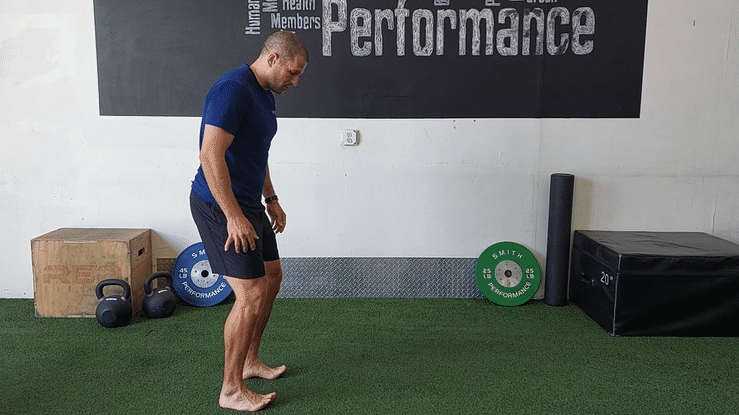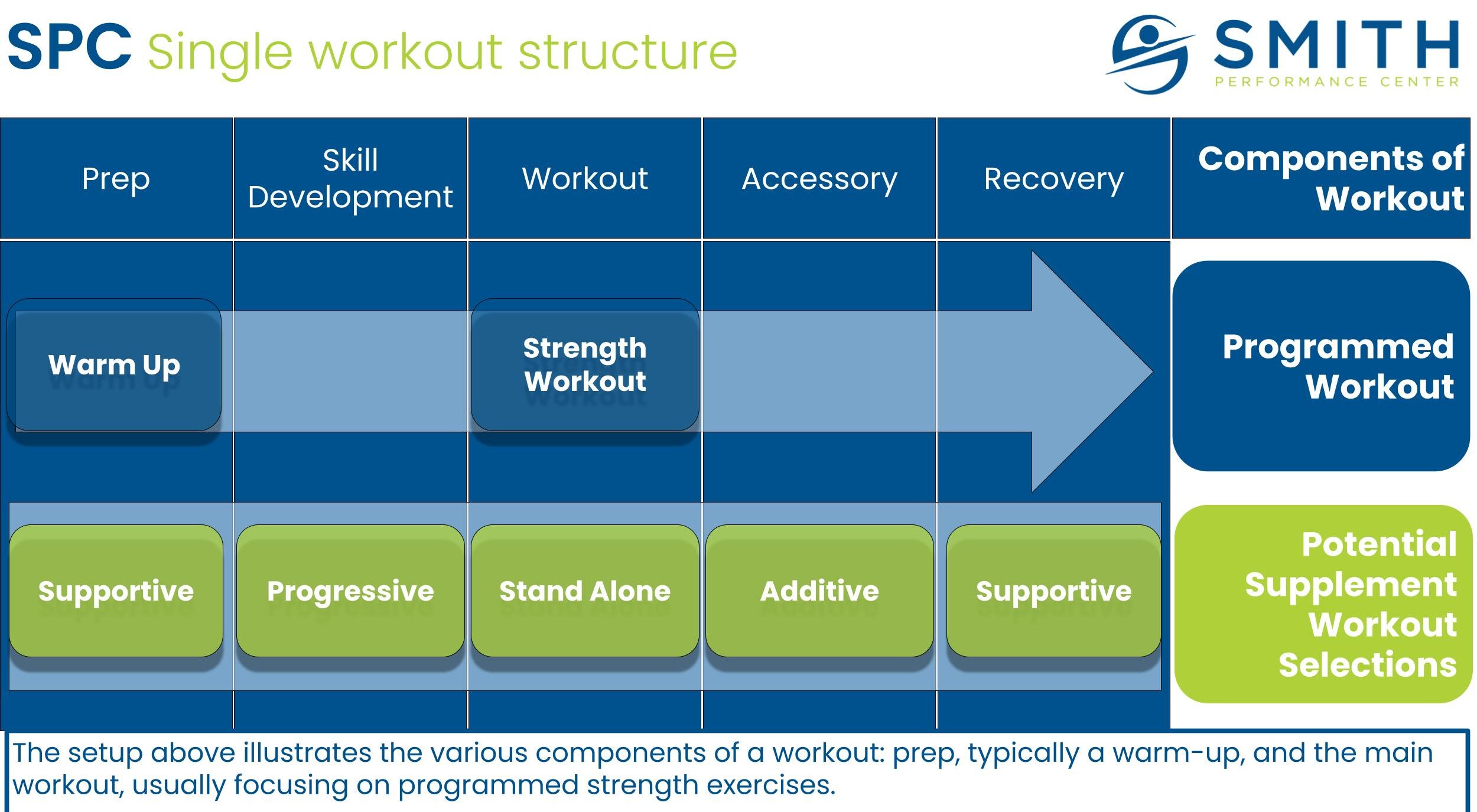Frequently Asked Questions
SPC operates differently
At SPC, our primary focus is guiding individuals with pain and injury toward an active, fulfilling lifestyle through our unique system.
Questions are common.
We strive for transparency. If you have any unanswered questions, please contact us.

Scheduling at Smith Performance Center
In the state of Arizona, you can come directly to physical therapy. You do not need a script from a physician to be examined, evaluated, or treated.
If you have a new injury and you do not have the ability to manage your own symptoms, we suggest starting with a physical therapy initial evaluation.
To start training at Smith Performance, we begin with a movement assessment.
You will work directly with a coach and during this session, we analyze the quality of 6 functional movement patterns, review your exercise history, and provide exercise recommendations.
You will be sent a medical history form and a consent form when you book your initial evaluation. This can be filled out online.
If you fill this out prior to the session, you do not need to arrive early.
For your session, bring anything that you feel is relevant to your problem. If you hurt walking in certain shoes, bring those shoes.
You should wear, or bring with you, clothes that are comfortable that allow you to move.
For pain or injuries in leg:
If you are having problems with your legs (pain in the hip, knee or feet), make sure to bring any shoes that you wear for daily activities or for running and walking. If possible, wear clothes that allow us to see or feel the area that hurts. So if you have a knee injury, shorts that expose the knee would be preferable.
For pain or injuries in the arm:
Hand, wrist, thumb, and elbow injuries may be originating up into the shoulder, upper back, and neck. If possible, wear or bring with you a looser shirt, tank top or under shirt that you feel comfortable wearing during an examination. Occasionally we will use tape and/or bracing to help with your pain. The easier it is to access your shoulder and the area surrounding it, the easier it will be for your therapist to examine and apply the treatment.
For pain or injuries in the neck, mid back, low back, and pelvis:
For these injuries, wear clothing that allows us to see the area. We want to visualize the area to check for any changes in the muscles or posture. To apply the treatments, we do not need the area to be exposed so as long your garment can be moved to expose the area for examination, that is sufficient for the session.
For specific activities that cause pain or discomfort:
For the first visit, we will determine if we need a video or have you do the activity during the session. The physical therapist will instruct on what to bring after the initial evaluation. Typically this is required only if you get the pain during this activity and your examination is negative or at the end of your physical therapy plan of care as you fully return to your activity.
We recommend scheduling with the first available physical therapist who fits your schedule. At SPC, all our physical therapists follow the same structured phases, examinations, and methodologies. We undergo extensive weekly training together, ensuring consistency in our practice. If your needs require a different therapist, we’ll coordinate a co-treatment or transfer of care accordingly.
We understand the importance of finding an experienced professional to address your specific concern.
While other healthcare organizations list the range of pathologies treated, rest assured, we specialize in orthopedic issues and can treat a variety of conditions. With decades of combined experience, our team is adept at addressing a wide spectrum of physical therapy needs, from common joint injuries to complex, long-standing chronic pain. Our clientele ranges from elite athletes, including Olympians, to individuals just beginning their fitness journey or struggling with mobility.
Medical professionals often rely on us for support in their treatment plans and diagnoses.
You can learn more about our diagnostic process here.
We recommend scheduling with the provider whose availability aligns best with yours. Should your needs change or require additional expertise, we seamlessly transfer your care or arrange co-treatments.
When you work with one member of our team, you benefit from the collective expertise of all.
We recommend scheduling the first appointment that works for you.
When you schedule, let us know that you would like to come in sooner. You can either do this by noting it on your appointment confirmation or calling our office at 520-398-4886.
We will place you on our cancellation list and will call you when any new appointment becomes available.
If it is a medical emergency, use Urgent Care or ER.
If you are not sure, you can call our office at 520-398-4886.
If this problem seems appropriate for physical therapy, we will place you on our cancellation list if no appointment is available the same day and get you into our facility as soon as possible.
Since we are a low volume clinic, we cannot guarantee immediate care.
Insurance, Medicare, and Payment
Unlike traditional physical therapy clinics that accept insurance, we prioritize a personalized approach. While insurance-based clinics often schedule multiple patients per hour and utilize assistants for exercises and passive modalities, our focus is on providing each patient with a full hour of one-on-one care with a physical therapist.
We prioritize your progress by dedicating our time solely to activities that directly contribute to your recovery, rather than billing for non-interactive and less useful services. This tailored approach leads to faster recovery and better results, helping you achieve your goals efficiently.
If you are not enrolled in Medicare, Smith Performance Center can provide a superbill of your visits to submit to your insurance carrier. This includes ICD 10 codes, CPT codes, place of service, cost, units, and date of service. We put on the superbill that you have paid in full for the service and all reimbursement needs to be sent to you. We have found that if you submit a superbill to insurance, you need to point out that it has been paid in full or they will send the payment to Smith Performance.
A superbill is different from a receipt (or paid invoice) that only includes the amount paid for the service.
We do not speak with insurance companies about billing. We are legally unable to send Superbills to anyone enrolled in Medicare.
At Smith Performance Center, our providers are un-enrolled with Medicare, which means Medicare will not reimburse you for our services. By choosing to receive physical therapy at our clinic, both you as the patient and we as the practitioner agree not to contact Medicare for reimbursement.
While we can provide you with a receipt for your records, it will not include coding.
Physical therapy is a service covered by Medicare when provided by an enrolled provider. We respect your decision if you choose to seek treatment at another facility.
We believe in transparency when it comes to the cost of care. We will never hide our service fees or require a discovery phone call to provide pricing.
You can easily view our prices in the scheduling widget or by calling our office at (520) 398-4886.
Payment is due in full at the time of each session.
A Cotreat is a specialized service where two practitioners, either two physical therapists or a physical therapist and a strength coach, work together during a single session to enhance client outcomes.
The price for a cotreat session is the same as a standard visit charge.
There are no additional fees when our team reviews your case or if more providers are present during your visit.
We accept payment via debit cards, credit cards, HSAs, and FSA cards. Additionally, we also accept cash and checks.
The System at Smith Performance Center
These are the 5 most common problems our team at Smith Performance Center works on with our patients and members:
- Pain and injury are keeping you from normal activity. You do not know the cause or what to do.
- You are unable to manage your own pain without help from a medical provider or medication. If you do not use medication or some other treatment that you cannot do yourself, then you will have pain or a setback.
- You want to increase your activity level from where you are now, but this leads to you feeling bad again.
- You want to have an active lifestyle but seem to stop doing your workouts after a few weeks or months.
- You want to perform at a high level and stretch your physical capabilities but do not know where to focus your energies.
We believe there are significant differences between care at SPC and other rehab and training facilities.
At SPC, we provide comprehensive care for individuals struggling with pain, injury, or inactivity. Our approach integrates physical therapy, strength training, education, and community support to help you understand and manage your health effectively.
We operate as a low-volume clinic, prioritizing patient empowerment. Our goal is to make you independent of our team by equipping you with the tools and knowledge to manage your health autonomously.
Our team follows a systematic approach to address your specific needs, ensuring the right problem is solved with the right solution at the right time. We focus on achieving your goals without overtreating, and we won’t discharge your case until you’ve reached your desired outcomes.
Unlike traditional models, we utilize both physical therapists and strength coaches to manage the rehab process. Our physical therapists are responsible for diagnosing, creating an effective home plan, and addressing contributing factors to your problem. Our coaches are integral team members who oversee your activity progression and design a lifelong exercise plan tailored to your needs.
To learn more about our unique system, click here.
At Smith Performance Center, we pride ourselves on being a low-volume clinic. We believe that providing our clinicians, coaches, and team with ample time allows us to better serve you by thoroughly applying our strategies and developing your goals.
Here’s what being a low-volume clinic means for you:
- We do not double book appointments.
- We limit the total number of sessions per week for our physical therapists to ensure quality care.
- We utilize co-treats to leverage the expertise of our team members on specific topics during a single session.
- Patient cases are regularly reviewed as a team during our weekly training sessions.
- We do not use assistants in our practice.
- Our typical plan of care involves one visit per week initially, gradually transitioning to periodic full visits and phone calls as you progress and return to activity.
This approach not only facilitates faster initial recovery but also ensures more durable results over time.
A high-volume clinic typically schedules 2-4 patients per hour per physical therapist. In these clinics, patients may be guided through exercises by a PT tech during the latter portion of a session, with the primary focus being on using the physical therapist as a patient manager alongside one or multiple assistants.
A patient mill is a subtype of high-volume clinic where more than 2 patients are seen per hour, often with minimal emphasis on the quality of care.
It’s important to note that not all insurance-based clinics are patient mills, though the majority of large, multi-site clinics may fall into this category.
When considering which clinic to choose, we recommend asking the following questions:
- How many patients are seen per hour?
- Is double booking allowed?
- How many patients are seen per day by the physical therapist?
- Will you have continuity of care, seeing the same physical therapist for follow-ups?
- How often will you see your physical therapist and for how long per session?
- What options are available if physical therapy isn’t helping you improve?
- What patient review processes are in place for patients who aren’t seeing improvement with care?
High volume clinics typically:
- Require assistants as one-on-one care is not feasible
- See multiple patients simultaneously
- Rely heavily on modalities, assistant-led exercises, or independent exercises that do not require the physical therapist’s presence
- Commonly double book appointments
- Have minimal pressure for outcomes and lack mechanisms for addressing problems as a team
- Lack reflection on care and standardization between providers
- Offer more scheduling opportunities due to double booking
In contrast, low volume clinics like SPC:
- Do not use assistants for service delivery
- Treat one client at a time with occasional co-treatments
- Rarely rely on modalities, focusing on more effective treatments
- Never double book appointments
- Experience significant pressure to solve problems with routine reviews by the clinical lead
- Prioritize the craft of the profession and develop thinking tools to support care
- Provide strong team support outside of one-on-one sessions
- Offer fewer scheduling opportunities due to no double booking and limitations on the number of patients per week
We recommend a low volume clinic if you prefer focused, one-on-one attention for your problem. For routine post-surgical care without complications, a high volume clinic may suffice. If location and insurance are critical, a high volume clinic might be preferable.
For more details, refer to our article ‘A Total Knee Case Study: Why You Need a Structured Rehab Process.
General Questions about Physical Therapy
We are sorry you had a bad experience with physical therapy.
Physical therapy can be very helpful, even life changing. We would love the opportunity to change your opinion. We will not waste your time on any activity you can do on your own will not be done with our team.
Our team has seen 5 common mistakes in physical therapy that lead to patient experiences. You can read more about that HERE along with our solutions to these mistakes.
We can give you any medical records you want and will communicate with any other provider.
We will never charge you for medical documentation generated from your treatment at Smith Performance Center.
The best way to work with your doctor or other care providers is to give you the medical records to take to your appointment. We can fax the paperwork to your other providers, however, we highly recommend that you print it off and hand it to your physician or provider during the session.
This can be shared via a safe link from our admin staff.
An overview of your visit will be sent after each visit. This includes the diagnosis, home plan, and any special instructions along with a separate confirmation email for the next visit time. The home plan will include videos on how to do your therapeutic activities.
While we can provide you with a receipt for your records, it will not include coding.
Physical therapy is a service covered by Medicare when provided by an enrolled provider. We respect your decision if you choose to seek treatment at another facility.
We do not believe restricting activity will allow tissue to heal. This is often fake improvement with the symptoms returning when you start back up.
Our team believes that activity is critical to health and any reduction in activity is not our goal. We will augment activities that are known triggers, provide support tools such as artificial stabilization and therapeutic exercises, to reduce or resolve pain with whatever activity is hurting you.
You can read more about trigger management HERE.
Our physical therapists will use manual therapy, including soft tissue massage, trigger point release, cross friction massage, mobilizations, and manipulation. Our focus is not on doing manual treatments that require you to come back to Smith Performance Center over and over. The goal is to determine a treatment that helps and train you to be able to do it without us.
We do not use one technique to the exclusion of others. We use your own methodology, which can be read HERE.
We focus on techniques you can do as our main goal is to get you independent and back to living the life you want.
General Questions about Strength Training
Our team specializes in returning people to an active lifestyle after an injury.
Learn more about how we progress your workouts after an injury.
The HHP Movement Assessment is for new SPC members. During this session, we analyze the quality of 6 functional movement patterns, review your exercise history, and provide exercise recommendations.
Strength training is a physical exercise that uses resistance against muscular contraction. This resistance comes in many forms, including body weight, free weight, bands, or machines (not used in our program). The resistance the body encounters during strength training forces it to adapt. The body believes it needs to adapt to survive. As a result, we gain the positive benefits of strength training. These benefits include increases in strength, power, speed, and body composition.
At Smith Performance Center, we train using free weights. The body receives far more benefits using free weights as opposed to machines. The use of free weights forces you to move in all planes of motion rather than one or two (as machines do). This, in turn, forces you to utilize more muscle, trains coordination and also forces you to utilize your core.
Yes, all endurance athletes for that matter will benefit from strength training. In long-duration, repetitive sports such as running, cycling, or swimming, many muscle imbalances develop. These imbalances often will lead to injury if not corrected. With strength training, we will address and combat these imbalances. Strength training also increases overall strength and power. This increase will result in increases in stamina and running efficiency.
Having a program in place is essential to strength training.
This is different than going out for a hard workout as seen in many class style programs.
Strength training is essentially stress placed on the body, which forces the body to adapt. Initially, any form of strength training will result in benefits, but as the body adapts to the imposed stress, more stimulus is needed to force the changes along with programmed recovery (we call this deloading).
For example, if you did three sets of ten repetitions on squat at the same weight for weeks, you would initially gain benefits, but eventually, that weight would not be challenging for you and you would plateau. The purpose of a comprehensive program is to continually stress the body to gain positive benefits and prevent a plateau.
This is where our Long Term Development model comes into play.
- Lack of program with specific workouts and alternative exercises based on how you are feeling
- Mistakes with loading too much or too little
- Overloading your tissue capacity (this is called a rehab standard violation – you can read more about it here)
- Ignoring a new injury (we catch and manage these in our open clinics)
- Skipping functional movements (we have our top 6 that form the foundation for all of you exercises)
- Missing deloads in your program (learn more about deloading here)
- Skipping workouts
SPC Membership
Your membership includes exercise programming, access to our coaches via check ins, free open clinics with the physical therapists, our SPC app, and discounts on select services.
You can be a member who uses our facility in person or online.
Health & Human Performance (HHP) is the name of the program we have developed for the SPC Strength Training System.
Open clinics are 15-minute sessions with one of our Physical Therapists. This is included in the SPC Strength Training System.
Open Clinic is designed to:
- diagnose new injuries or pain
- rule out red flags
- provide a home plan
- provide PT additions & exercise modifications or eliminations (this updates your program)
- determine if a full visit is required
- gather feedback from our community to improve our program & protocols.
This is a service provided to members only.
A Strength Coach Check-In is an opportunity for a member to talk one on one with a strength coach.
During these sessions, we can:
- Answer training questions
- Check in on your training goals
- Help improve training consistency
- Check in on your current training program and update if needed
- Assist with exercise technique
- Answer program-specific questions
- Answer SPC Workout App questions
- Check in on how your program is working
You do not have to be a member to schedule and perform one-on-one workout sessions.
After completing your one-time Movement Assessment, you are eligible for One on One Personal Training sessions.
One on one sessions are not considered part of the SPC membership.
We do not have open gym hours at the SPC Facility. In-person sessions are scheduled via the SPC app and supervised by a strength coach. We limit session sizes to 8 members.
The in-person sessions are not group classes. You have your own program on the SPC app along with access to our on-demand programming. The sessions are monitored by a strength coach.
There is no cancellation fee. If you feel this is not right for you, then you do not need to continue.
You can cancel anytime before your next monthly charge. We do not refund after your payment plan has been run.
We require a movement assessment to start our program. Beyond the cost of this session, there is not an additional charge to start at SPC.
If you are a returning member who paused or stopped we charge a $50 membership restart fee which includes a 30-minute session with a coach, either in person or online, but we do not require another movement assessment.




